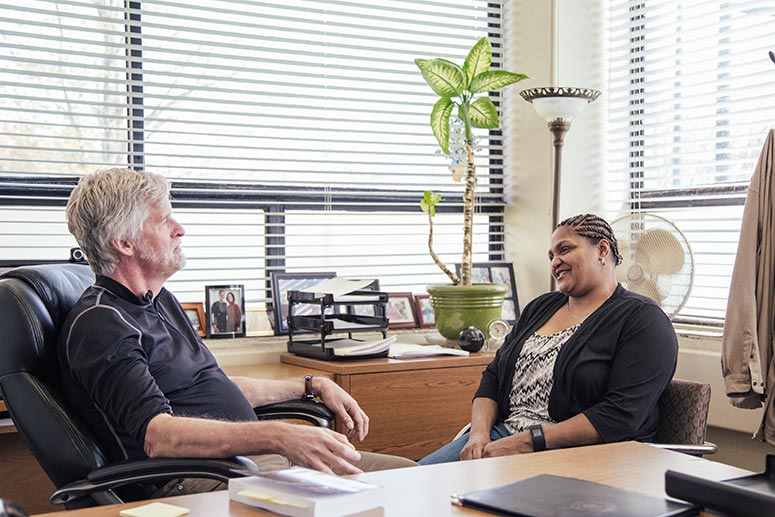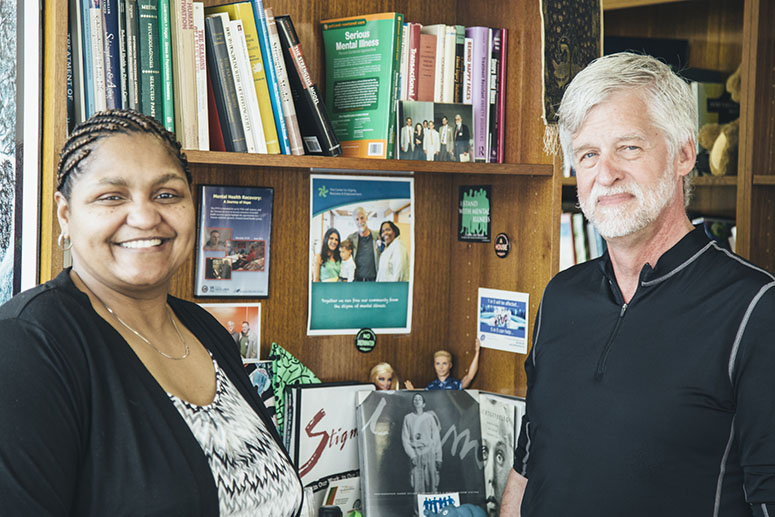Sonya Ballentine—four years ago “chronically homeless” and now an Illinois Tech research associate—is a soul soldier.
“What we do, we do as the two of us together,” says Patrick Corrigan, Distinguished Professor of Psychology at Lewis College of Human Sciences. “I’m the numbers guy and she’s the soul with the street smarts.”

Photo: Scott Benbrook
For 28 years Ballentine counted herself as one of society’s cast-offs, a restless, urban nomad with an untreated serious mental illness—in her case, bipolar disorder—suffering abuse through illegal substances, the wrong partners, and desperate lifestyle choices. Weary of her existence, she entered into an outreach program in 2012 offered by Heartland Alliance Outreach on Chicago’s North Side. By making the decision to save her own life, Ballentine would go on to help rescue countless other individuals through her involvement with Corrigan and his Community-Based Participatory Research (CBPR) project.
“The research suggests that people with serious mental illness get sick and die about 10–15 years earlier than everybody else; when you add to that being of color, low-income status, or homelessness, the number goes through the roof” -Patrick Corrigan
“At the time I met Pat, I had just moved into permanent housing through Heartland,” recalls Ballentine, her commanding and spirited voice not unlike those of the preachers in the churches of the South Side neighborhood where she grew up. “I went to Heartland’s resource center because I was experiencing a bad bout of depression—I felt isolated and alone in my apartment as it was totally different for me coming from shelter group settings—and noticed an application to participate in a consumer research team at Illinois Tech. I thought it would simply be an opportunity to make a few bucks and get out of the house.”
Corrigan hired Ballentine to be one of eight individuals comprising a CBPR team—community members with “lived experience”—who developed a program for peer navigators to assist others with serious mental illness who were homeless.
“The research suggests that people with serious mental illness get sick and die about 10–15 years earlier than everybody else; when you add to that being of color, low-income status, or homelessness, the number goes through the roof,” says Corrigan, a recognized CBPR practitioner and director of the National Consortium on Stigma and Empowerment.
Ballentine’s first project with Corrigan was so successful that in 2015 he obtained a two-year $250,000 grant from the Patient-Centered Outcomes Research Institute (PCORI), created as part of the Affordable Care Act, or Obamacare, to develop a curriculum, manual, and workbook to teach Chicago-area community-service providers how to establish their own CBPR programs. This year Corrigan’s team, including Ballentine, whom he retained as a research associate, selected two providers—Heartland Alliance and Emmaus Ministries—as participants in the new program, Inspiring Change.

“Emmaus is the only organization that is dedicated full time to reaching out to men in survival sex in Chicago. I would estimate we serve 150–300 African-American men with mental illness every year. For the men we have worked with over the past year, more than 72 percent deal with at least one serious mental health illness; the majority of the men we serve are also African American,” says Libby Trudeau, client services analyst. “Inspiring Change intrigued us because a CBPR model includes the opinions and input of the men. Our project involves a survey about how these men get physical health care. We will be exploring what barriers and needs this population might face.”
Emmaus, and Heartland, which is designing a self-management wellness program, have each been awarded up to $21,000 to complete their projects by December 31. Through a second, multi-million dollar grant from the National Institute on Minority Health and Health Disparities, Corrigan and Ballentine will examine how African Americans with serious mental illness control weight gain through diet and exercise when they live in food and activity deserts. In the fall he will begin a funded collaborative CBPR project with Associate Professor of Psychology Eun-Jeong Lee on family decision making among Korean-Americans with Type 2 diabetes. Corrigan says that his funding will allow Ballentine to continue assisting him for another five years.
“Growing up I passed IIT I don’t know how many times, never thinking that I would enter into a building here—and now I have an IIT ID,” says Ballentine, shaking her head as she muses over how different her life is today. “I never knew that the challenges I experienced in the past would literally become assets for the future. My hope and desire is to help other people who are in the position I was in to do the same thing. I’ll no longer be the exception. I’ll be the norm.”
More Online
Emmaus Ministries: streets.org
“Engaging Patients with Mental Illness in Patient-Centered Outcomes Research”: vimeo.com/156000385
Heartland Alliance: www.heartlandalliance.org